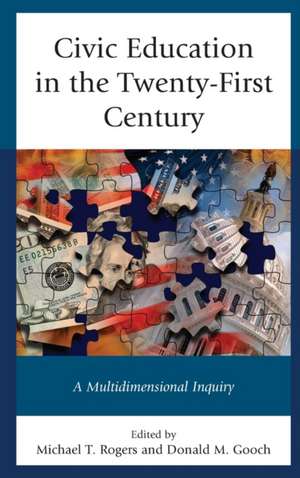Civic Education in the Twenty-First Century
en Limba Engleză Hardback – 18 sep 2015
Preț: 1013.70 lei
Preț vechi: 1388.64 lei
-27% Nou
Puncte Express: 1521
Preț estimativ în valută:
194.01€ • 202.01$ • 163.95£
194.01€ • 202.01$ • 163.95£
Carte tipărită la comandă
Livrare economică 07-21 martie
Preluare comenzi: 021 569.72.76
Specificații
ISBN-13: 9780739193495
ISBN-10: 073919349X
Pagini: 528
Ilustrații: 48 tables, 20 graphs
Dimensiuni: 155 x 231 x 43 mm
Greutate: 0.95 kg
Editura: Rowman & Littlefield
ISBN-10: 073919349X
Pagini: 528
Ilustrații: 48 tables, 20 graphs
Dimensiuni: 155 x 231 x 43 mm
Greutate: 0.95 kg
Editura: Rowman & Littlefield
Notă biografică
Cuprins
Introduction, Michael T. Rogers
Section I: The Case for Civic Education
Chapter 1: A Meta-History of Formal Civic Education: An Episodic History to be Repeated?, Michael T. Rogers
Chapter 2: It Can Work: The Surprisingly Positive Prospects for Effective Civic Education, Robert Maranto
Chapter 3: The Irony of Civic Education in the United States, Jeffrey D. Hilmer
Chapter 4: Models of Civic Education in America, Gary E. Bugh
Section II: 21st Century Innovations in Civic Education
Part A: National Government
Chapter 5: The Role of Congressional Outreach in Civic Engagement: An Examination of Legislator Websites, Sally Friedman and Jessica L. Aubin
Chapter 6: Encouraging Civic Participation through Twitter during (and after) the 2012 Election, Heather K. Evans
Chapter 7: Engagement through the Oval Office: Presidential Rhetoric as Civic Education, Sara A Mehltretter Drury and Jeffrey P. Mehltretter Drury
Part B: State and Local Government
Chapter 8: An Examination of Judicial Civic Education and Community Outreach Efforts, Brendan Toner
Chapter 9: The Civically Oriented Activities of Big City Mayors: The View from Website Press Releases, Michael A. Armato and Sally Friedman
Chapter 10: Encouraging Civic Participation of Citizens through County Websites: A Case Study of Arkansas, Barbara Warner
Part C: Private Institutions
Chapter 11: Interest Groups, Twitter, and Civic Education, Shamira Gelbman
Section III: Civic Education in Institutions of Higher Education
Part A: Classroom-based Studies
Chapter 12: Dude, Where¿s the Civic Engagement? The Paradoxical Effect of Civic Education on the Probability of Civic Participation, Donald M. Gooch and Michael T. Rogers
Chapter 13: Educating Students about the National Debt: A Multiyear Study of Civic Education in the University Core Curriculum, Steven E. Galatas and Cindy Pressley
Chapter 14: Moving Civic Education Research Forward: The Inter-Campus Consortium for SoTL Research, J. Cherie Strachan and Elizabeth Bennion
Part B: Initiatives Beyond the Classroom
Chapter 15: Democratizing Information: Web 2.0 Tools at Fort Hays State University, Chapman Rackaway and Carolyn Campbell
Chapter 16: Teaching Local: Civic Engagement & Local Government, Mike Yawn
Chapter 17: Partnering with your Local PBS Station to Promote Civic and Political Engagement, Elizabeth Bennion
Conclusion, Donald M. Gooch
Descriere
Imagine an America where governmental institutions, schools, new technologies, and interest groups work together to promote more informed citizens. Civic Education in the Twenty-First Century brings together the research of scholars from various disciplines to show that by expanding what is done in isolation, we can realize such a healthy civic ecology.
